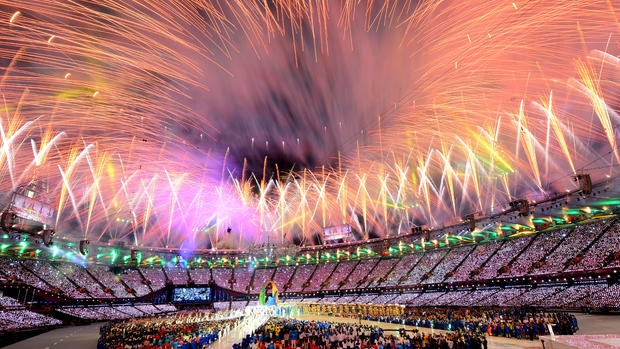Olympics come to a rocking end with star-studded closing ceremony
With a little British pomp and a lot of British pop, London brought the curtain down on a glorious Olympic Games on Sunday in a spectacular, technicolor pageant of landmarks, lightshows and lots of fun.
The closing ceremony offered a sensory blast including rock 'n' roll rickshaws, dustbin percussionists, an exploding yellow car and a marching band in red tunics and bearskin hats.
There was a show-stopping reunion of the Spice Girls, who sang their hits "Wannabe" and "Spice Up Your Life" while riding atop bedazzled taxi cabs. Eric Idle of Monty Python gave a rousing rendition of "Always Look on the Bright Side of Life," accompanied by Roman centurions, Scottish bagpipers and a human cannonball.
Liam Gallagher performed "Wonderwall," a 1990s hit by his former band, Oasis, Muse rocked the house with the hard-edged Olympic anthem "Survival," and Queen guitarist Brian May was joined by singer Jessie J for a crowd pleasing "We Will Rock You."
The night ended with the extinguishing of the multi-petaled Olympic cauldron and a supercharged rendition of "My Generation" and other classics by The Who that had the crowd dancing in the aisles. Confetti rained down, and fireworks lit up the sky.
It was all delivered in a psychedelic mashup that had 80,000 fans at Olympic Stadium stomping, cheering and singing along. Organizers estimated 300 million or more were watching around the world.
Festive and fast-moving, the ceremony opened with pop bands Madness, Pet Shop Boys and One Direction, not to mention a shout-out to Winston Churchill and a tribute to the Union Jack - the floor of Olympic Stadium floor arranged to resemble the British flag.
Monochrome recreations of London landmarks were covered in newsprint, from Big Ben's clock tower and Tower Bridge to the London Eye ferris wheel and the chubby highrise known as the Gherkin.
Street percussion group Stomp built the noise into a frenzy, and dancers brandished brooms, in a nod to the spontaneous popular movement to clean up London after riots shook neighborhoods not far from Olympic Stadium just a year ago.
Footage of John Lennon singing "Imagine," remastered and straight from Yoko Ono's archives, was shown on the big screen as his face appeared on the stadium floor, assembled by 101 fragments of sculpture, and just as quickly gave way to George Michael.
Other performances Sunday came from Annie Lennox, Take That, Fatboy Slim, Taio Cruz, the Kaiser Chiefs and The Kinks' Ray Davies, who performed the 1960s song "Waterloo Sunset, a love letter to London. Comedian Russell Brand got in on the action, singing "I am the Walrus" from atop a tour bus, and style also became part of the show when British models including Kate Moss and Naomi Campbell took part in an homage to British fashion, appropriately set to David Bowie's hit song "Fashion."
The headline performers were each paid a pound, a little more than $1.50.
Kate, Duchess of Cambridge, and Prince Harry took seats next to Jacques Rogge, the president of the International Olympic Committee. They sang along to "God Save the Queen." There was no sign of the queen herself, who made a memorable mock parachute entrance at the July 27 opening ceremony.
But perhaps the best seats in the house were for the 10,800 athletes, who marched in as one, rather than with their nations, symbolizing the harmony and friendship inspired by the games.
As the crowd cheered their heroes and flashbulbs rippled through the stadium, the Olympians cheered back, some carrying national flags, others snapping photographs with smartphones and cameras. They held hands, embraced and carried each other on their shoulders, finally forming a human mosh pit on the field.
Eight minutes were turned over to Brazil, host of the 2016 Games in Rio de Janeiro, which featured an explosion of samba, sequins and Latin cool. Following tradition, the mayor of London handed the Olympic flag off to his Rio counterpart.
The closing ceremony ended an Olympic Games that were far more successful than many Londoners expected. Security woes were overcome, and traffic nightmares never materialized. The weather held up, more or less, and British athletes overachieved.
It all came with a price tag of $14 billion - three times the original estimate. But nobody wanted to spoil the fun with such mundane concerns, at least not on this night.
"We lit the flame, and we lit up the world," said London organizing committee chief Sebastian Coe. "When our time came, Britain, we did it right."
International Olympic Committee President Jacques Rogge declared the Olympics over with praise for the athletes.
"Through your commitment to fair play, your respect for opponents, and your grace in defeat as well as in victory, you have earned the right to be called Olympians," he said, adding "these were happy and glorious games."

